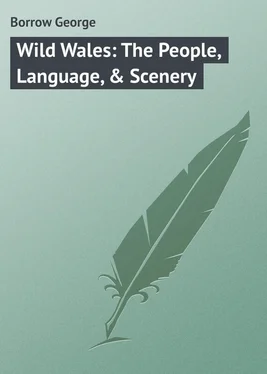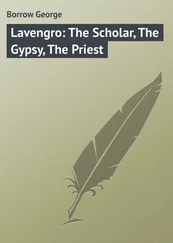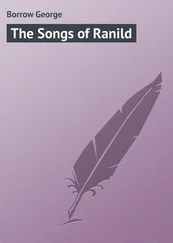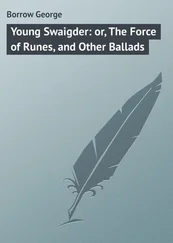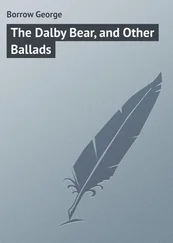George Borrow - Wild Wales - The People, Language, & Scenery
Здесь есть возможность читать онлайн «George Borrow - Wild Wales - The People, Language, & Scenery» — ознакомительный отрывок электронной книги совершенно бесплатно, а после прочтения отрывка купить полную версию. В некоторых случаях можно слушать аудио, скачать через торрент в формате fb2 и присутствует краткое содержание. Жанр: foreign_prose, Путешествия и география, на английском языке. Описание произведения, (предисловие) а так же отзывы посетителей доступны на портале библиотеки ЛибКат.
- Название:Wild Wales: The People, Language, & Scenery
- Автор:
- Жанр:
- Год:неизвестен
- ISBN:нет данных
- Рейтинг книги:5 / 5. Голосов: 1
-
Избранное:Добавить в избранное
- Отзывы:
-
Ваша оценка:
- 100
- 1
- 2
- 3
- 4
- 5
Wild Wales: The People, Language, & Scenery: краткое содержание, описание и аннотация
Предлагаем к чтению аннотацию, описание, краткое содержание или предисловие (зависит от того, что написал сам автор книги «Wild Wales: The People, Language, & Scenery»). Если вы не нашли необходимую информацию о книге — напишите в комментариях, мы постараемся отыскать её.
Wild Wales: The People, Language, & Scenery — читать онлайн ознакомительный отрывок
Ниже представлен текст книги, разбитый по страницам. Система сохранения места последней прочитанной страницы, позволяет с удобством читать онлайн бесплатно книгу «Wild Wales: The People, Language, & Scenery», без необходимости каждый раз заново искать на чём Вы остановились. Поставьте закладку, и сможете в любой момент перейти на страницу, на которой закончили чтение.
Интервал:
Закладка:
I directed my course towards the west, to the head of the valley. My wife and daughter after walking with me about a mile bade me farewell, and returned. Quickening my pace I soon left Llangollen valley behind me and entered another vale, along which the road which I was following, and which led to Corwen and other places, might be seen extending for miles. Lumpy hills were close upon my left, the Dee running noisily between steep banks, fringed with trees, was on my right; beyond it rose hills which form part of the wall of the vale of Clwyd; their tops bare, but their sides pleasantly coloured with yellow corn-fields and woods of dark verdure. About an hour’s walking, from the time when I entered the valley, brought me to a bridge over a gorge, down which water ran to the Dee. I stopped and looked over the side of the bridge nearest to the hill. A huge rock about forty feet long, by twenty broad, occupied the entire bed of the gorge, just above the bridge, with the exception of a little gullet to the right, down which between the rock and a high bank, on which stood a cottage, a run of water purled and brawled. The rock looked exactly like a huge whale lying on its side, with its back turned towards the runnel. Above it was a glen with trees. After I had been gazing a little time a man making his appearance at the door of the cottage just beyond the bridge, I passed on, and drawing nigh to him, after a slight salutation, asked him in English the name of the bridge.
“The name of the bridge, sir,” said the man, in very good English, “is Pont y Pandy.”
“Does not that mean the bridge of the fulling mill?”
“I believe it does, sir,” said the man.
“Is there a fulling mill near?”
“No, sir, there was one some time ago, but it is now a sawing mill.”
Here a woman, coming out, looked at me steadfastly.
“Is that gentlewoman your wife?”
“She is no gentlewoman, sir, but she is my wife.”
“Of what religion are you?”
“We are Calvinistic Methodists, sir.”
“Have you been to chapel?”
“We are just returned, sir.”
Here the woman said something to her husband, which I did not hear, but the purport of which I guessed from the following question which he immediately put.
“Have you been to chapel, sir?”
“I do not go to chapel; I belong to the Church.”
“Have you been to church, sir?”
“I have not – I said my prayers at home, and then walked out.”
“It is not right to walk out on the Sabbath day, except to go to church or chapel.”
“Who told you so?”
“The law of God, which says you shall keep holy the Sabbath day.”
“I am not keeping it unholy.”
“You are walking about, and in Wales when we see a person walking idly about, on the Sabbath day, we are in the habit of saying Sabbath breaker; where are you going?”
“The Son of Man walked through the fields on the Sabbath day, why should I not walk along the roads?”
“He who called Himself the Son of Man was God, and could do what He pleased, but you are not God.”
“But He came in the shape of a man to set an example. Had there been anything wrong in walking about on the Sabbath day, He would not have done it.”
Here the wife exclaimed, “How worldly-wise these English are!”
“You do not like the English,” said I.
“We do not dislike them,” said the woman; “at present they do us no harm, whatever they did of old.”
“But you still consider them,” said I, “the seed of Y Sarfes cadwynog, the coiling serpent.”
“I should be loth to call any people the seed of the serpent,” said the woman.
“But one of your great bards did,” said I.
“He must have belonged to the Church, and not to the chapel then,” said the woman. “No person who went to chapel would have used such bad words.”
“He lived,” said I, “before people were separated into those of the Church, and the chapel; did you ever hear of Taliesin Ben Beirdd?”
“I never did,” said the woman.
“But I have,” said the man; “and of Owain Glendower too.”
“Do people talk much of Owen Glendower in these parts?” said I.
“Plenty,” said the man, “and no wonder, for when he was alive he was much about here – some way farther on there is a mount, on the bank of the Dee, called the mount of Owen Glendower, where it is said he used to stand and look out after his enemies.”
“Is it easy to find?” said I.
“Very easy,” said the man, “it stands right upon the Dee and is covered with trees; there is no mistaking it.”
I bade the man and his wife farewell, and proceeded on my way. After walking about a mile, I perceived a kind of elevation which answered to the description of Glendower’s mount, which the man by the bridge had given me. It stood on the right hand, at some distance from the road, across a field. As I was standing looking at it a man came up from the direction in which I myself had come. He was a middle-aged man plainly but decently dressed, and had something of the appearance of a farmer.
“What hill may that be?” said I in English, pointing to the elevation.
“Dim Saesneg, sir,” said the man, looking rather sheepish, “Dim gair o Saesneg.”
Rather surprised that a person of his appearance should not have a word of English I repeated my question in Welsh.
“Ah, you speak Cumraeg, sir,” said the man, evidently surprised that a person of my English appearance should speak Welsh. “I am glad of it! What hill is that, you ask – Dyna Mont Owain Glyndwr, sir.”
“Is it easy to get to?” said I.
“Quite easy, sir,” said the man. “If you please I will go with you.”
I thanked him, and opening a gate he conducted me across the field to the mount of the Welsh hero.
The mount of Owen Glendower stands close upon the southern bank of the Dee, and is nearly covered with trees of various kinds. It is about thirty feet high from the plain, and about the same diameter at the top. A deep black pool of the river, which here runs far beneath the surface of the field, purls and twists under the northern side, which is very steep, though several large oaks spring out of it. The hill is evidently the work of art, and appeared to me to be some burying-place of old.
“And this is the hill of Owain Glyndwr?” said I.
“Dyma Mont Owain Glyndwr, sir, lle yr oedd yn sefyll i edrych am ei elynion yn dyfod o Gaer Lleon. This is the hill of Owen Glendower, sir, where he was in the habit of standing to look out for his enemies coming from Chester.”
“I suppose it was not covered with trees then?” said I.
“No, sir; it has not been long planted with trees. They say, however, that the oaks which hang over the river are very old.”
“Do they say who raised this hill?”
“Some say that God raised it, sir; others that Owain Glendower raised it. Who do you think raised it?”
“I believe that it was raised by man, but not by Owen Glendower. He may have stood upon it, to watch for the coming of his enemies, but I believe it was here long before his time, and that it was raised over some old dead king by the people whom he had governed.”
“Do they bury kings by the side of rivers, sir?”
“In the old time they did, and on the tops of mountains; they burnt their bodies to ashes, placed them in pots and raised heaps of earth or stones over them. Heaps like this have frequently been opened, and found to contain pots with ashes and bones.”
“I wish all English could speak Welsh, sir.”
“Why?”
“Because then we poor Welsh who can speak no English could learn much which we do not know.”
Descending the monticle, we walked along the road together. After a little time I asked my companion of what occupation he was and where he lived.
Читать дальшеИнтервал:
Закладка:
Похожие книги на «Wild Wales: The People, Language, & Scenery»
Представляем Вашему вниманию похожие книги на «Wild Wales: The People, Language, & Scenery» списком для выбора. Мы отобрали схожую по названию и смыслу литературу в надежде предоставить читателям больше вариантов отыскать новые, интересные, ещё непрочитанные произведения.
Обсуждение, отзывы о книге «Wild Wales: The People, Language, & Scenery» и просто собственные мнения читателей. Оставьте ваши комментарии, напишите, что Вы думаете о произведении, его смысле или главных героях. Укажите что конкретно понравилось, а что нет, и почему Вы так считаете.
